‘Art therapy could be benefit to all schools’ says Cork teacher
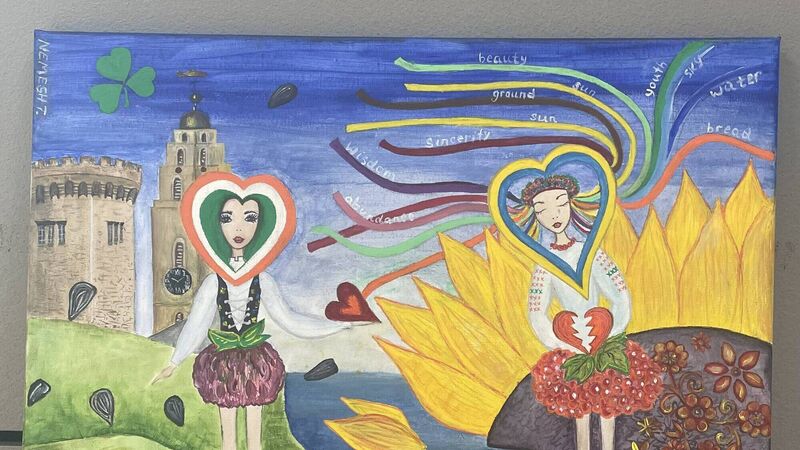
A painting created by the Ukrainian children for Culture Day in Scoil Nioclais, Grange, County Cork.
MANY Irish schools have welcomed Ukrainian children in recent years.
As of the end of 2022, just over 13,750 Ukrainian pupils were enrolled here, with the majority, about 8,800, entering primary school classrooms.
Ahead of the return to school, Therese Barrett, English Additional Language (EAL) teacher in Scoil Nioclais, Grange, Cork, chatted to me about how her school welcomed their new arrivals. Throughout our conversation, she put the emphasis on wellbeing, particularly when it comes to older students.
Managing The Transition
Therese begins by explaining the vast difference in teaching a junior infant child versus a child in sixth class.
“The younger children tend to live in the moment and they are much more like their Irish peers, learning reading and writing for the first time. It is much harder to get to know a child at an older age. For one thing the curriculum is too difficult for them to access. In Ukraine, they finish national schools system at ten years old so they also feel like maybe they are too old for primary.
“Not participating is also a choice they can control. When you think about it, they really have no control over anything else, not even the country they’re living in.”
The focus, she says, must always be on creating a bond with children, and particularly with children coming from such a difficult context. In the age of social media, they are fully aware of what is going on in their country, she suggests.
“We found that it was much harder for some children to engage. They needed something different to what we were offering the younger Ukrainian children.
The curriculum offers choice to engage children, but sometimes something different is needed.
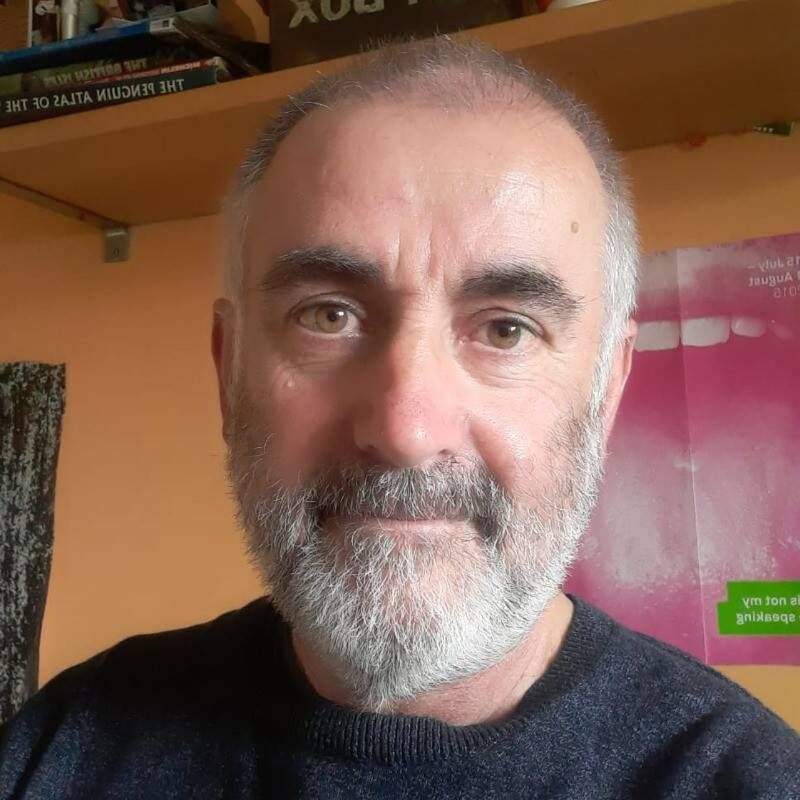
When Art Psychotherapist Patrick Bryne approached the school, with the idea of running a six-week pilot scheme, the community knew it made sense.
Art Therapy
At therapy is exactly as it sounds: it is an offering of therapy through the medium of art.
I sat down with Patrick also, to get a feel for what he offers Ukrainian children in Cork schools.
Patrick explains that art therapy is a form of counselling but it’s not only for people who are in dire straits. It is all about wellbeing, allowing people to tap into themselves.
“Play is very important in art therapy. When I’m with a young person, I become my own young person. Of course, I am still a psychotherapist but I must connect with the child also.”
Patrick shows me a card trick as we chat, something he often does to connect with children, an activity that doesn’t rely on any common language.
He has a private practice in Wilton but enjoys going in to schools and organisations.
“Scoil Nioclais were brilliant. They gave me my own space in the school. That sense of containment is very important for the therapy.
The child needs to recognise the therapeutic space. It’s a kind of performance in a space and it offers somewhere for the child to go with their feelings.
Referencing my earlier conversation with Therese around the importance of choice, he says he never forces anything in the sessions.
“Choice is very important. I would never force a child to come back to the space if they didn’t want to. And there’s also the choice of material. The child can choose from paper, pencils, clay, markers, paint, whatever. A child might spend the time just chopping up paper into scraps. Anything goes.”
The work is entirely client-centred, he explains. There are no set expectations.
“It’s not about being an artist, it’s about having the time and space to express yourself. The child might be chatty or we might be silent together. It is a humanistic approach.
“I might ask the child to create their own island, for example. Then I might ask them questions about it. Or we might just sit quietly together and I might hold the space. It varies from child to child.”
It is all about the dynamics of a therapeutic relationship, he explains.
“I am not a teacher. I’m not there to teach the children anything. This is a very different thing.
I am also not a parent. I am something else. Sometimes I will comment on their work and sometimes just producing it is enough.
Wider approach
Another step taken by the school was to group children together.
“We focused on what was a priority. They were worried about their country and their loved ones and so the regular curriculum was inappropriate. At certain levels the curriculum is too difficult to access because of that language barrier.”
Although Ms Barrett doesn’t mention the particulars of her students’ lives, it is well known that many Ukrainian children are potentially sharing hotel rooms with family members. They also try to keep up with online education from Ukraine. These realities makes their ordinary days more complicated. Ms Barrett’s approach therefore seems fitting.
“The school day with us was going to be very long for them if we didn’t employ some creative strategies. We played a lot of games working on language, building their vocabulary. We cooked together. One of our memorable days was making sushi together which is very popular there.”
Parents were very supportive of school staff, explains Therese, and they wanted to fully participate in school life.
“Both the parents and the children were great and they put on an amazing spread for our Culture Day. They enjoyed seeing a representation of their culture. It helps that our school is so multi-cultural. We had 22 countries on display that day so the children from Ukraine certainly don’t feel like the odd ones out.”
Therese shares her empathy and her desire to respond to the bigger picture for these children.
“Children need to feel safe and happy before they can learn. That has to come first,” she says.
School Recommendation
Therese Barrett says the school also got some very helpful resources from the National Educational Psychological Services (NEPS).
“They visited the school and offered us some helpful tips and resources. But a lot of this is about using your instincts and building bonds first.
“We were delighted to have the option of art therapy and certainly feel it could be of benefit to all schools. I also think it could be useful for a child suffering from any kind of trauma.
In other countries, they have mental health experts in schools and Irish schools could really benefit from having therapists like Patrick involved in looking after young people.
Therese is changing jobs next year and will teach fourth class. She looks back on her time with the school’s Ukrainian students fondly.
“Last year’s sixth class children are left now and I won’t be seeing them come September. I hope they’ll continue to do well in secondary school. I learned so much from them. I know a lot about Ukraine now; I only wish our experience together hadn’t come out of such an awful time for them all.”
The teacher feels art therapy is something all schools might benefit from trying. This is a support for their wellbeing. School is not only about the academic – that’s important to remember.”
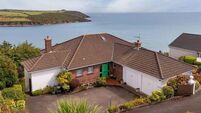
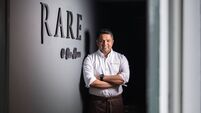
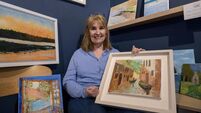




 App?
App?


